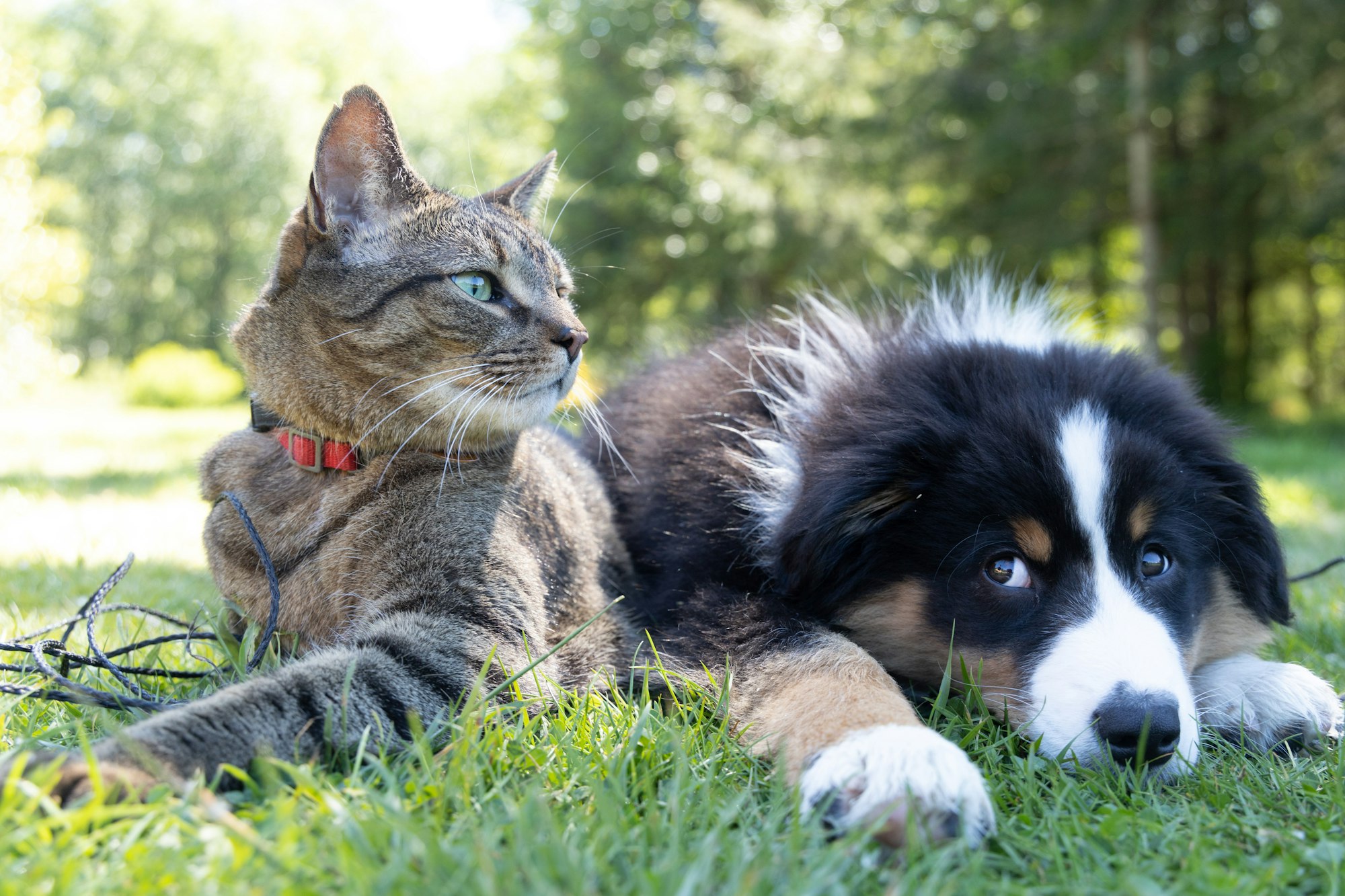The Healing Power of Pets for Alzheimer's Disease
Discover how pets can improve the emotional well-being of those with Alzheimer's Disease. From companionship to reducing anxiety, learn how dogs and cats can make a significant difference.

By Beverly Powell
During a respite, I had the opportunity to reflect on my father-in-law's passing and our decision to welcome Joyce into our home. While I was eager to do so, I couldn't ignore that Joyce, who had once held high cleanliness standards and had strong opinions about pets in her home, might have reservations.
In the past, Joyce had owned a few dogs and a large fish, but they were long gone. My own insecurities and doubts crept in, and I worried that our two tabby cats, Popcorn and Peekaboo, and our two dogs, Daphne and Minnie, might make her uncomfortable or disdainful. The dogs, Daphne, a playful terrier, and Minnie, a husky/wolf with striking blue eyes, were accustomed to attention from visitors, while the cats were usually independent. However, I had no doubt that Joyce would be accepting of them.
The day finally arrived when we would bring Joyce to our new home. As we entered, she was greeted by my adorable terrier, and I held my breath. To my surprise, Joyce looked down and smiled, speaking clearly to Daphne, showing immediate affection. The first hurdle was overcome. Then, she settled in her own chair, brought from her house, and Minnie timidly approached, lowering her head as if seeking a pat. Again, Joyce spoke clearly and coherently. The ice had finally been broken.
In the following days, the cats greeted Joyce with purrs and smiles, and she quickly grew fond of them. It was a relief to see the animals create a welcoming environment for her. When Joyce was away at the adult center or a doctor's appointment, the dogs waited faithfully by her chair, and the cats eagerly welcomed her upon her return. It was clear that she cherished and accepted them as much as they did her.
Since then, we've adopted another cat, and Joyce often converses with it more than with the rest of us. When the nurse visits, as long as the dogs are nearby, Joyce responds to the nurse's questions while maintaining a strong, steady heartbeat. They seem to provide her with strength and peace of mind.
All my initial fears and insecurities have since dissipated. I've observed how the dogs prevent her from feeling anxious or agitated, while the cats distract her from any potential harm. These pets have been a source of comfort as she navigates the challenges of this dreadful disease. They instill hope in me for a job I never thought I could handle. They bring a smile to her face when nothing else can. In these final stages, where she speaks very little, sleeps a lot, and eats less, she smiles more and her laughter is a bit brighter.
I've now come to the conclusion that pets may not be a cure for Alzheimer's disease, but they are a remedy for the emotional turmoil it brings. Dogs, in particular, exhibit remarkable compassion for both the young and the elderly, especially those with Alzheimer's. Cats provide soothing comfort during the storms, both inside and outside.

The Power of Pets as Therapy: Enhancing the Lives of Dementia Patients and the Elderly
Harnessing the remarkable bond between animals and humans, pet therapy has proven to be a game-changer for those in need. Scientific research reveals that just 15 minutes of petting a cat or dog can significantly boost emotional well-being and reduce stress levels.
But what exactly is pet therapy?
It involves using animals to provide affection and companionship in various settings such as nursing homes, rehabilitation facilities, and hospices. These therapy pets participate in regular visiting programs or engage in more structured activities as part of therapeutic programs.
While dogs are the most popular choice for therapy pets due to their innate intelligence and intuition, any animal can fulfill the role depending on the needs and preferences of the individuals they visit. Cats offer comfort to those who fear larger animals, while larger creatures like alpacas and donkeys provide a welcome distraction for those prone to anger or restlessness.
Equine therapy, through horse riding, offers significant benefits for the elderly, improving balance, posture, and flexibility. Smaller animals like guinea pigs and rabbits provide comfort and promote muscle activity when stroked repeatedly. Parrots, with their high level of empathy and ability to mimic speech, are ideal companions for those struggling with their own speech. Even watching fish swimming peacefully in a tank can have a profound calming effect, promoting relaxation and igniting creativity.

Pet therapy goes beyond mere companionship
It brings positive changes to the lives of those it touches. For the elderly, the friendship, love, and affection of animals offer transformative benefits. It is especially effective in easing the challenges faced by dementia patients. But its advantages extend far beyond that, including:
Tackling loneliness
Caring for an animal or receiving a visit from a therapy pet combats feelings of isolation by increasing oxytocin levels, promoting well-being and bonding. Animals, particularly dogs, are great listeners and react to human voices and emotions. Taking a dog for a walk fosters social interaction within the local community, while the natural craving for companionship in animals makes them joyful around people.
Relieving stress, anxiety, and depression
The physical act of stroking and playing with an animal triggers chemical reactions in the brain, leading to increased endorphin levels for relaxation. Serotonin levels rise, stabilizing moods and reducing depression and anxiety, while cortisol levels decrease, relieving stress.
Boosting self-worth
The act of caring for an animal instills a sense of purpose and focus, fostering self-esteem. Therapy pets offer unconditional love and affection to those who have recently lost loved ones, providing them with a renewed sense of purpose. Older individuals being cared for benefit greatly from activities like walking, brushing, and feeding an animal, empowering them as caregivers.
Benefits for cancer patients
Therapy dogs play a crucial role in the lives of people living with cancer, offering unwavering emotional connection and comfort. Extensive research has shown that pet therapy during chemotherapy sessions reduces depression, fatigue, and improves blood oxygenation. Additionally, cancer patients with therapy dogs require less pain medication.
Support for stroke patients
Therapy dogs aid in the recovery of stroke patients through movement and speech practice. The simple act of stroking an animal reduces spasticity and increases motor recovery.
Pet therapy is a remarkable tool that brings happiness, healing, and a renewed sense of purpose to those in need. Discover the transformative power of animals as therapy companions.
How Robotic Dogs for Seniors Improve Quality of Life
Our Resources section can help you find the information and tools that you need. We have courses, videos, checklists, guidebooks, cheat sheets, how-to guides and more.
You can get started by clicking on the link below. We know that taking care of a loved one is hard work, but with our help you can get the support that you need.
Click here to go to Resources Section now!
Meet Beverley Powell
The Challenges of Being A Caregiver



